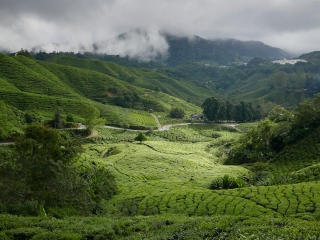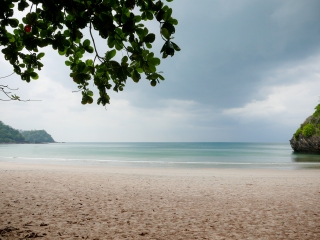Penang was on my itinerary simply for getting a Thai visa. Unplanned and unknown, it grew on me the moment I set foot there and ventured down a narrow alley. British colonial mansions and Chinese shop houses colorfully flank the streets of the historic town center—reminders of a cosmopolitan past, probably brimming with tales in their cracks and weathered wallpapers. As if the architectural enticement weren’t enough, hawkers of various culinary convictions invade these streets at different moments of the day, establishing a kaleidoscope within a kaleidoscope, with the present and the past continuously disputing the territory of your senses.
https://www.youtube.com/watch?v=E6IaYW_qzu8
However, I never got to enjoy the city properly, and besides timid walks around the hostel and the two mandatory trips to the Thai Consulate, I had to cancel the more ambitious plans. The reason: I had broken one of the ten commandments of travelers – thou shalt give yourself some time to adjust. The crime: I spent the first week of my trip running around like a Pacman, eager to munch down as many places, alleys, jungle trails as possible. I got little sleep in the poorly insulated room I had booked in Kuala Lumpur. I pushed myself in the Cameron Highlands, even though I could already sense something was wrong. From thick winter boots I switched directly to thin sandals, as if winter and summer were just interchangeable. I exposed my overly sensitive skin to the sun, confident in the high protection factor displayed on the sunscreen. The revenge of my body came all at once in Penang. The result: widespread skin allergy which on one leg turned into an infection (hello new bacteria in the tropics!), blisters on more than half of the soles, and two lost toe nails. I could hardly walk, to the point that kind drivers were offering me rides. The skin problems were tolerable, but not being able to count on my legs was terrifying. It defeats the whole purpose of traveling.
One afternoon as I lie achingly in bed I tell myself this must be the lowest point of my journey and it cannot get any worse. I look up the closest doctor and enter a shabby building with a corroded “Clinic” sign. I self-diagnose with a guilty face and the doctor agrees to everything I’m saying. He apologizes for the dilapidated state of his clinic, especially since he assumes everything is in much better condition in Romania. (I can’t even begin to prove him wrong.) We promptly go through the medical ritual, and then for the better part of an hour our conversation switches to grand topics like progress, the state of the world, the new generation. The doctor recalls his time as a youth development counselor for the UN and a decisive moment when he held a critical speech at a UN convention, with only the support of three other countries. He does not regret that moment. Thanks to the UN assignment, he traveled the world and can still describe with great detail places and scenes from all over Europe. I see the continent through his eyes: reliable infrastructure, access to education, well functioning healthcare. Then he switches gears, talks about the future, and wonders how the young generation will address the imminent problems concerning overpopulation and climate. When the time comes to close the clinic for the day, the doctor ushers me into another cabinet, where an old Indian, who looks as if he holds all the secrets to the universe and all you have to do is ask, wraps a bandage around my wound. The doctor found him on the streets and taught him how to dress wounds; he has worked in the clinic ever since. I receive a bag of medicine and ointments with clear instructions which I conscientiously follow over the next weeks. For a third of the price I would pay for a consultation in a “modern” clinic back home, in Malaysia I got a diagnosis, the necessary treatment in sterile plastic bags, and a great conversation.
Being slow did have some advantages in the end. Since I was more or less bound to the hostel area, I walked down the same street many times, at different moments of the day, and witnessed the characteristic life rhythm which I would soon adopt myself: effervescent mornings, sleepy afternoons, gregarious evenings. While stopping to rest in a Penang post office one day, I was approached by D.A., a local of Chinese origin, educated in the U.S. (liberal arts) but “unhappy” with his current job (restaurant owner). We ended up talking for two hours: D.A. took on a professor’s posture and gave me an anthropology lesson on Malaysia’s ethnic groups, scribbling the most important concepts on his English-language newspaper—until there was no more space. He confirmed my impression of “separately together” that I had while looking at the people in Kuala Lumpur, though in his view the situation goes beyond the surface level and involves discrimination: the Malay are privileged, while the Chinese and Indians are treated like second-class citizens. It was one of the most illuminating spontaneous conversations I’ve ever had. In Langkawi, my final destination in Malaysia, I rented a scooter to substitute for my poor mobility. After a day of tachycardia and brain overload (left- vs right-hand traffic), I successfully passed my first scooter driving test—a baptism that would prove very useful later on.
Two weeks after the beginning of my journey, I say goodbye to Malaysia while boarding a ferry to Thailand. I part with an incomplete impression, which I blame on the fact that these two weeks were an adjustment to traveling and to the new climate. Onboard the ferry, perhaps as cultural preparation, they are showing a Thai comedy with a cast made entirely of ladyboys; the passengers, mostly Malay, giggle the whole time. But this is a side of Thailand that I am less interested in, so I turn my head and look out the porthole at the Andaman Sea.













Leave a Reply